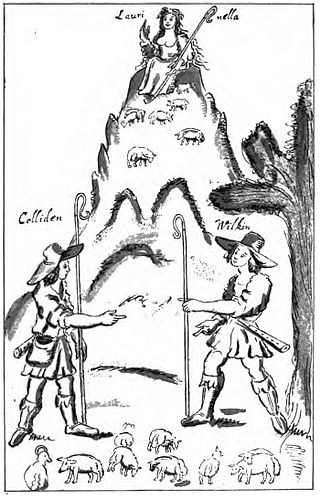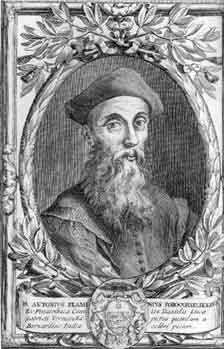Related Research Articles

John Milton was an English poet, polemicist, and civil servant. His 1667 epic poem Paradise Lost, written in blank verse and including twelve books, was written in a time of immense religious flux and political upheaval. It addressed the fall of man, including the temptation of Adam and Eve by the fallen angel Satan and God's expulsion of them from the Garden of Eden. Paradise Lost elevated Milton's reputation as one of history's greatest poets. He also served as a civil servant for the Commonwealth of England under its Council of State and later under Oliver Cromwell.

Andrew Marvell was an English metaphysical poet, satirist and politician who sat in the House of Commons at various times between 1659 and 1678. During the Commonwealth period he was a colleague and friend of John Milton. His poems range from the love-song "To His Coy Mistress", to evocations of an aristocratic country house and garden in "Upon Appleton House" and "The Garden", the political address "An Horatian Ode upon Cromwell's Return from Ireland", and the later personal and political satires "Flecknoe" and "The Character of Holland".

John Dryden was an English poet, literary critic, translator, and playwright who in 1668 was appointed England's first Poet Laureate.
Richard Crashaw was an English poet, teacher, High Church Anglican cleric and Roman Catholic convert, who was one of the major metaphysical poets in 17th-century English literature.
Alexander Brome was an English poet.

Roger Boyle, 1st Earl of Orrery, 25 April 1621 to 16 October 1679, was an Anglo-Irish soldier and politician. A younger son of the Earl of Cork, the largest landowner in Munster, like many Irish Protestants he supported the Dublin Castle administration during the Irish Confederate Wars, a related conflict of the Wars of the Three Kingdoms.

Venantius Honorius Clementianus Fortunatus, known as Saint Venantius Fortunatus, was a Latin poet and hymnographer in the Merovingian Court, and a bishop of the Early Church who has been venerated since the Middle Ages.
Cynddelw Brydydd Mawr, was the court poet of Madog ap Maredudd, Owain Gwynedd, and Dafydd ab Owain Gwynedd, and one of the most prominent Welsh poets of the 12th century.

William Basse (c.1583–1653?) was an English poet. A follower of Edmund Spenser, he is now remembered principally for an elegy on Shakespeare. He is also noted for his "Angler's song", which was written for Izaak Walton, who included it in The Compleat Angler.

John Skelton, also known as John Shelton was an English poet and tutor to King Henry VIII of England. Writing in a period of linguistic transition between Middle English and Early Modern English, Skelton is one of the most important poets of the early Tudor period. Though strongly influenced by the Chaucerian tradition, Skelton is mostly remembered for his poems on everyday themes and invectives, written in an irregular metre now usually called Skeltonics. He also wrote the first secular morality play in English, Magnyfycence, an important landmark in the development of English Renaissance theatre.

Elegy Written in a Country Churchyard is a poem by Thomas Gray, completed in 1750 and first published in 1751. The poem's origins are unknown, but it was partly inspired by Gray's thoughts following the death of the poet Richard West in 1742. Originally titled Stanzas Wrote in a Country Church-Yard, the poem was completed when Gray was living near the Church of St Giles, Stoke Poges. It was sent to his friend Horace Walpole, who popularised the poem among London literary circles. Gray was eventually forced to publish the work on 15 February 1751 in order to preempt a magazine publisher from printing an unlicensed copy of the poem.

Elizabeth Thomas was a British poet and letter writer. She was part of an important artistic group in London and John Dryden named her "Corinna". However, she suffered from lifelong financial precarity, romantic disappointment, and latterly, health problems. Her reputation was damaged by Alexander Pope and she spent three years in a debtor's prison near the end of her life.

Elizabeth Jane Weston was an English-Czech poet, known for her Neo-Latin poetry. She had the unusual distinction for a woman of the time of having her poetry published.

Marcantonio Flaminio, also known as Marcus Antonius Flaminius, was an Italian humanist poet, known for his Neo-Latin works. During his life, he toured the courts and literary centers of Italy. His editing of the popular devotional work, the "Beneficio di Cristo" illustrated a hope that the Catholic Church would move closer to some of the thinking of the Protestant reformers.
Nationality words link to articles with information on the nation's poetry or literature.
Robert Freind (1667–1751) was an English clergyman and headmaster of Westminster School.
Raphael Thorius M.D. was a London physician of Huguenot and Flemish background, known as a poet and humanist.
Martin Lluelyn (1616–1682) was a poet and physician of probable Welsh ancestry.
Thomas Philipot was an English poet and miscellaneous writer. The son of Somerset herald John Philipot, he proceeded M.A. at Clare Hall, Cambridge, regiis literis, in 1636, and was incorporated in that degree at Oxford in 1640. He published some poetical works and contributed to miscellanies.
Robert Whitehall was an English poet, and fellow of Merton College, Oxford.
References
- ↑ "Fisher, Payne (FSR637P)". A Cambridge Alumni Database. University of Cambridge.
- ↑ Wood, Athenæ, Bliss, iv. 377
- ↑ Lives of the Poets, pp. 192, 193
![]() This article incorporates text from a publication now in the public domain : "Fisher, Payne". Dictionary of National Biography . London: Smith, Elder & Co. 1885–1900.
This article incorporates text from a publication now in the public domain : "Fisher, Payne". Dictionary of National Biography . London: Smith, Elder & Co. 1885–1900.